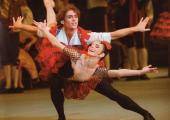Biutiful

Javier Bardem tries to bridge the gap between this life and the next
Alejandro González Iñárritu’s stunning, painfully sincere - if somewhat laborious - latest is a heartfelt paean to fatherhood, built around an agonising escalation of misery. It is bolstered by a mesmerising performance from Javier Bardem as a terminally ill man experiencing physical deterioration alongside spiritual elevation, who bridges the gap between this life and the next.









